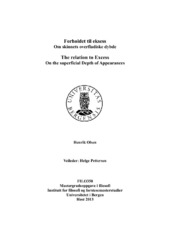Forholdet til eksess - Om skinnets overfladiske dybde
Master thesis
Permanent lenke
https://hdl.handle.net/1956/7622Utgivelsesdato
2013-11-20Metadata
Vis full innførselSamlinger
- Department of Philosophy [235]
Sammendrag
Denne masteroppgaven vil ta for seg begrepet eksess, og hvordan forholdet til denne påvirker vårt forhold til skinnet, eller verden av tilsynekomster. Inspirert av Nietzsche vil jeg tolke skinnet som den sansbare verden og det umiddelbart gitte. Også forståelsen av eksess vil i stor grad støtte seg på hans forståelse av verden som vilje til makt. Viljen til makt og følgelig tanken om den evige gjenkomst vil garantere for at verden ikke kan gripes som uforanderlig væren, eller gis en perfekt fordobling i teori, men må forstås som tilblivelse. I dette lyset, og med dette perspektivet vil jeg se dynamikken mellom viljen til å gripe verden i ro, og hvordan dens konstant fluktuerende karakter forhindrer dette. The purpose of this master's thesis is to investigate the notion of excess in different world-conceptions. I will show how our understanding of this will impact how we regard the world of appearances and also how it will affect the process of subjectivation. I will base my thesis on Nietzsche's fundamental conception that both the world and the human agent are fields of exuberant forces, and that these need to be dealt with responsibly. The relation to excess is then to be seen as an ineluctable one. Nietzsche's name for this excess is, as I will understand it, the will to power". This involves an understanding of the world as Becoming rather than Being. It is a fundamental principle that prevents any static terminus, and will also challenge identities from remaining identical to themselves. I find the same notion in the works of philosophers who have been influenced by Nietzsche in the 20th century. The first of these will be Georges Bataille, whose notion of excess implied a subsequent need for expenditure. I will also investigate Walter Benjamin's analysis concerning how the increasingly technical reproduction needs to rid itself of excess in order for its products to become eligible for mass-production and mass-communication. I will compare Benjamin's analysis of the technological development with Pierre Klossowski's interpretation of Nietzsche to further discuss the making of copies without an original, understood as simulacra. I will also show how Baudrillard sees an accelerated state of these tendencies in the postmodern world, and meets them with his concept of integral reality. The philosophers I refer to in this thesis all seem to be concerned with a movement of human activity away from its material basis, and towards an increasingly operationalised reality. I will however show how the world's fluctuating character prevents this operationalisation from reaching its completion.
